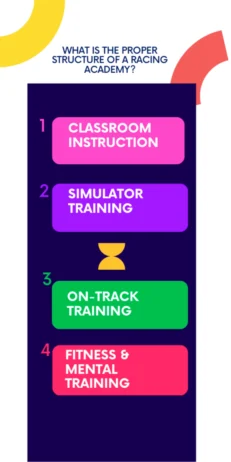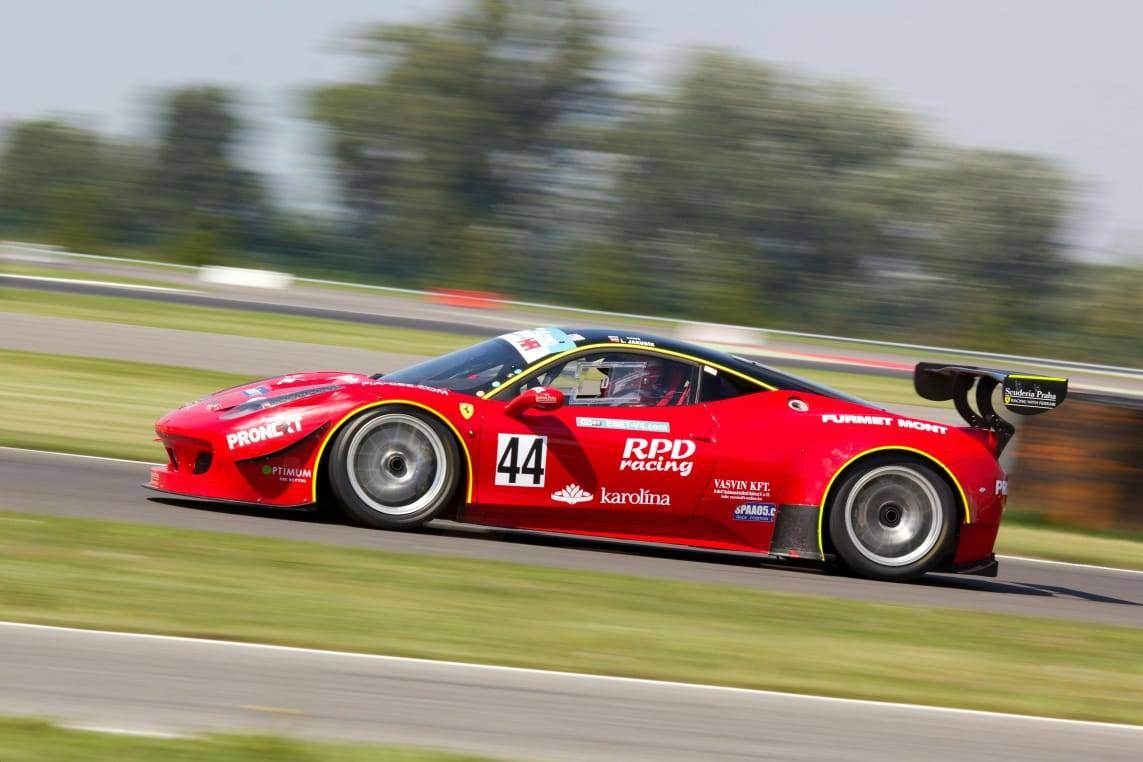The racing journey commences when we first take hold of the car steering and engage it in first gear. This process, a shared experience for all, begins with learning to drive and progresses into refining racing skills. A racing academy, an essential catalyst in this journey, transforms a beginner into a proficient racer equipped to excel on the tracks. These academies provide a structured environment where individuals can immerse themselves in the thrill and excitement of motorsport, learning the skills and techniques necessary to excel in various forms of racing.
What Does The Racing Academy Mean?
A racing academy is an educational institution that teaches high-performance driving and racing principles and practices. There are different types of racing academies, each with its focus and approach. For instance, some academies specialize in a particular form of motorsport, such as Formula 1 or NASCAR, while others offer a more general curriculum covering various racing forms.
What Is The Proper Structure Of A Racing Academy?
As Capital Exotic wondered, a reputable racing academy is a comprehensive training facility for aspiring and seasoned race car drivers. It offers a structured setting where students can enhance their driving abilities, grasp racing mechanics, and cultivate the mental resilience needed for high-speed competition. Here’s an overview of the typical workings of a reputable racing academy:

Classroom Instruction
Classroom sessions provide the theoretical foundation for understanding car mechanics, aerodynamics, racing lines, and safety measures. Students learn about the physics of racing, such as weight distribution, tire dynamics, and braking techniques.
Simulator Training
Modern racing academies use high-tech simulators that mimic real-world driving situations. These simulators provide students with a safe environment to practice and improve their driving skills, allowing them to learn track layouts and perfect their techniques without the dangers of on-track driving.
On-Track Training
The core element of any racing academy is to offer students the opportunity to gain practical driving experience on professional race tracks while supervised by experienced instructors. This hands-on approach allows students to practice essential racing techniques, including cornering, overtaking, and handling various track conditions.
Fitness & Mental Training
Racing requires both physical and mental wellness. Many academies provide fitness training to enhance drivers’ endurance, reflexes, and overall physical condition. Cognitive training is also essential, focusing on concentration, stress management, and maintaining focus in high-pressure situations.
Pros Of Joining A Racing Academy
Enrolling in a racing academy offers aspiring and experienced race car drivers numerous advantages.
1. Professional Instruction
- Expert Guidance: Learn from experienced instructors and professional drivers who provide expert guidance and insights.
- Personalized Coaching: Get ready for customized guidance and custom feedback to help you maximize your strengths and overcome your weaknesses.
2. Comprehensive Skill Development
- Driving Techniques: Master essential techniques such as cornering, braking, and acceleration.
- Advanced Skills: Develop advanced racing skills, including racecraft, overtaking maneuvers, and defensive driving.
3. Safety Training
- Safety Protocols: Gain a thorough understanding of racing safety protocols, including using safety gear and emergency procedures.
- Crash Recovery: Learn how to handle and recover from on-track incidents safely.
4. Access To High-Quality Equipment
- State-of-the-Art Facilities: Train at top-tier facilities with modern tracks, simulators, and equipment.
- High-Performance Vehicles: Drive various high-performance racing cars, gaining experience with different vehicle dynamics.
5. Performance Analysis
- Data-Driven Feedback: Benefit from telemetry and video analysis to understand and improve driving performance.
- Continuous Improvement: Use detailed performance data to identify areas for improvement and track progress over time.
6. Physical & Mental Conditioning
- Fitness Programs: Participate in physical fitness programs to enhance strength, endurance, and reflexes.
- Mental Training: Under pressure, develop mental toughness, focus, and decision-making skills.
7. Networking Opportunities
- Industry Connections: Connect with professional drivers, racing teams, and industry experts.
- Career Advancement: Build relationships that can lead to sponsorships, team placements, and other career opportunities in motorsports.
8. Real-World Experience
- Track Time: Gain extensive time to practice and refine driving skills in real-world conditions.
- Competitive Environment: Participate in mock races and racing events to gain practical racing experience.
9. Structured Learning Environment
- Curriculum-Based Training: Follow a structured curriculum that ensures comprehensive coverage of all essential aspects of racing.
- Progressive Learning: Advance through different levels of training, from basic skills to advanced race techniques.
10. Certification and Credibility
- Recognized Certification: Earn certification upon program completion, enhancing credibility and marketability.
- Professional Development: Demonstrate commitment and proficiency in racing, which can help you pursue further opportunities in motorsports.
11. Confidence Building
- Skill Mastery: Develop confidence by mastering driving techniques and understanding racing dynamics.
- Risk Management: Learn to manage risks effectively, enhancing overall confidence.
Cons of Attending a Racing Academy
When considering enrolling in a racing academy, weighing the various aspects is essential. Here are some points to consider:
1. High Cost
- Tuition Fees: Racing academies can be expensive, with tuition fees running into thousands of dollars.
- Additional Expenses: Costs for travel, accommodation, and racing gear can add up, making it a significant financial investment.
2. Physical Activities
- Intense Training: Racing’s physical demands require a high fitness level, which can be challenging for some individuals.
- Risk of Injury: High-speed racing carries inherent risks, including potential accidents and injuries.
3. Time Commitment
- Intensive Programs: Training programs can be time-consuming, requiring significant time and effort.
- Balancing Responsibilities: Balancing academy commitments with work, family, or other responsibilities can be difficult.
4. Location & Accessibility
- Limited Availability: Racing academies may not be easily accessible to everyone, as they are often far from major cities.
- Travel Requirements: Attending a distant academy may require extensive travel, which can be inconvenient and costly.
5. Competitive Pressure
- High Expectations: The competitive environment can be intense, with high expectations for performance and improvement.
- Stress and Anxiety: The pressure to perform well can lead to stress and anxiety for some participants.
6. Career Uncertainty
- No Guarantees: Completing a racing academy does not guarantee a successful career in motorsports.
- Highly Competitive Industry: The motorsport industry is highly competitive, and securing opportunities can be challenging.
7. Focus On Specific Skills
- Niche Training: Niche training is often highly specialized and may not apply to other driving or motorsport activities.
- Limited Versatility: Skills learned may not quickly transfer to other careers or hobbies outside of racing.
8. Financial Risk
- Investment Returns: The financial investment in a racing academy may yield a different return if one fails in racing.
- Opportunity Cost: Time and money spent on racing training could be invested in other career or personal development opportunities.
You don’t need to worry; we have your back. Check out our article to help you buy a cheap car at the start of your racing career.
Related Topic: The Best Cheap Cars For Racing in 2024
Why Should You Choose Capex Racing Academy As A Priority?
Capital Exotic always tries to provide you with the best services without any doubt. Our racing academy is famous for our loyalty to customers and training material.
Exceptional Training
Capex Racing Academy provides a comprehensive training experience that combines in-class and on-track instruction led by IMSA Pro team instructors. This ensures that you receive professional-grade skill development.
High-Performance Vehicles
Experience the thrill of driving a wide range of luxury and supercars, from McLarens to LMP Prototype cars, for an unmatched driving adventure.
Comprehensive Curriculum
At Capex Racing Academy, aspiring racers learn essential driving techniques, master vehicle dynamics, understand safety regulations, and gain mechanical knowledge. We provide aspiring racers with a comprehensive education to help them succeed.
Exclusive Benefits
Remember all the great stuff you get! You’ll get fabulous gift bags, free meals, access to VIP Sky Boxes, discounted rides, and a fun happy hour to relax after an exciting day.
Final Verdict
As a racing academy, we don’t want to hide anything from you. We have openly explained the pros and cons without any hesitation. Racing academies play a vital role in shaping the careers of aspiring racers by providing them with the necessary skills, knowledge, and experience. While the benefits are substantial, weighing them against the potential drawbacks is essential. By carefully choosing the right academy and committing to rigorous training, you can set yourself on the path to success in the thrilling world of motorsport.

































